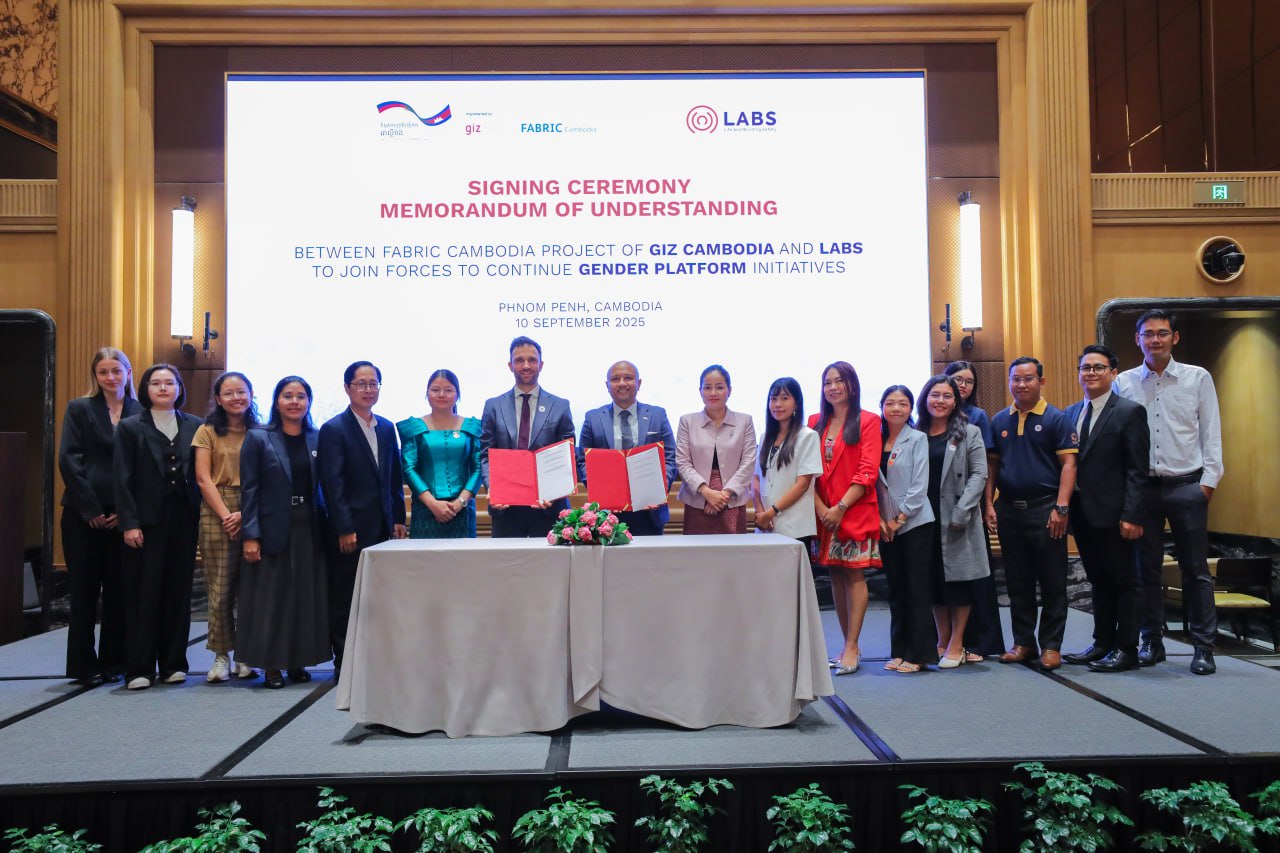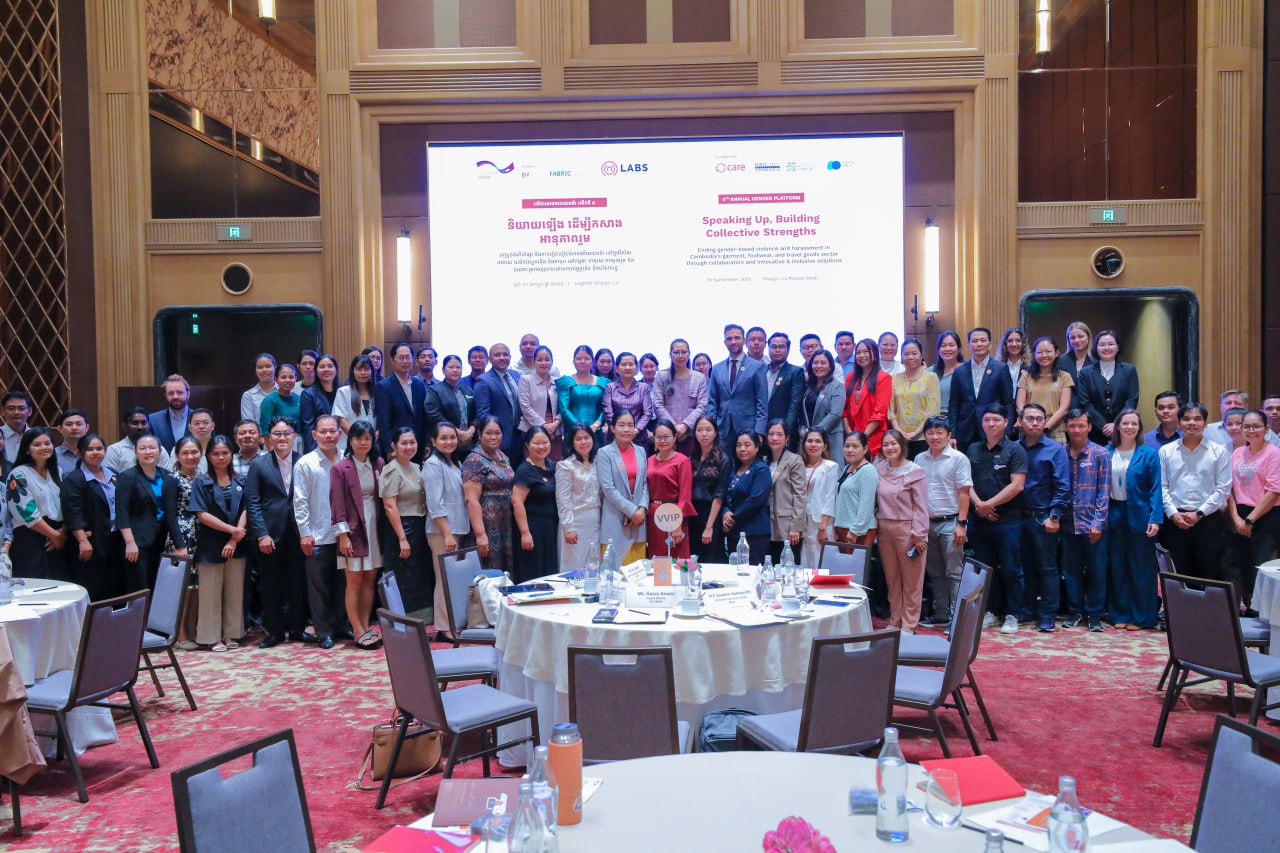The 4th Annual Gender Platform brought together over 100 representatives from government, industry, civil society, brands, and trade unions to advance action against gender-based violence and harassment (GBVH) in Cambodia’s garment, footwear, and travel goods (GFT) sector. Themed “Speaking Up, Building Collective Strengths: Ending GBVH in Cambodia’s GFT Sector Through Collaboration, Innovative and Inclusive Solutions,” the gathering underscored the urgency of addressing GBVH as both a human rights issue and a driver of sustainable growth in the country’s most vital export industry.
Co-organized by the Deutsche Gesellschaft für Internationale Zusammenarbeit (GIZ) GmbH project GIZ-FABRIC Cambodia, the Life and Building Safety (LABS) Initiative, CARE Cambodia, the Responsible Business Hub Cambodia, and EuroCham’s Garment & Manufacturing Committee, the platform reaffirmed that tackling GBVH requires coordinated action across the public and private sectors. Senior officials from the Ministry of Labour and Vocational Training (MLVT) and the Ministry of Women’s Affairs (MoWA) joined factory leaders, worker representatives, and development partners to discuss policy reforms, survivor-centered solutions, and the critical role of international brands in shaping safer workplaces.
A highlight of this year’s platform was the launch of the Women Empowerment Network (WE Network), which builds upon the success of the Women Empowerment House (WE House) initiative. The network expands community-based approaches to GBVH prevention and survivor support, creating safe spaces for women workers and strengthening referral mechanisms. The event also showcased innovations such as grievance platforms, GBV reporting apps, financial literacy programs, and collaborative campaigns led by local NGOs, unions, and brands.

The gathering also marked the signing of a new Memorandum of Understanding between the GIZ project FABRIC Cambodia and the LABS Initiative to formalize ongoing collaboration in advancing gender equality and workplace safety in Cambodia’s garment sector. The agreement signals a shared commitment to strengthening multi-stakeholder partnerships and scaling interventions that protect workers’ safety and dignity.
Voices from the Platform
Her Excellency Sovann Vannaroth, Permanent Secretary of State, Ministry of Labour and Vocational Training, emphasized: “Eliminating gender-based violence and harassment in the workplace is a shared responsibility of all stakeholders, aimed at promoting labor rights and enhancing productivity.”
Pramit Chanda, Global Director – Textile and Manufacturing, IDH, and spokesperson for the LABS Initiative, noted: “Addressing complex challenges such as gender-safety requires collective action from all stakeholders – government bodies, industry leaders, civil society, and workers. By working together, we can build safer workplaces that empower workers and contribute to the long-term sustainability and growth of the sector.”
Hasso Anwer, Project Director of the FABRIC Cambodia project at GIZ Cambodia, shared: “The annual Gender Platform provides a critical space for us to come together and develop approaches for Women Empowerment in the GFT industry and beyond. Addressing GBVH is not the responsibility of one actor alone; it requires an unwavering and shared commitment by all industry stakeholders. With our flagship initiative, WE House, and our newly launched WE Network, GIZ will continue supporting these efforts in collaboration with our partners.”
Sinuon Hun, Technical Advisor for Advancing Women and Girls, CARE Cambodia, added: “Ending gender-based violence and harassment in Cambodia’s GFT sector demands bold collaboration—where government, civil society, and industry unite to drive survivor-centered, sustainable change. This Gender Platform gives us a crucial opportunity to continue the stakeholders’ commitment, investment, and collaborative aspiration toward gender equality and ending GBVH in the GFT sector in Cambodia.”
The discussions at this year’s platform built on momentum from previous gatherings, which have pushed for stronger reporting mechanisms, digital tools for GBVH prevention, and greater male engagement in workplace gender equality. Despite progress, participants acknowledged ongoing challenges such as cultural norms that enable harassment, underreporting of incidents, and gaps in survivor services. The 2025 platform called for unified training approaches, stronger legal enforcement, and increased brand accountability, emphasizing that collective action is essential to transform the industry.









